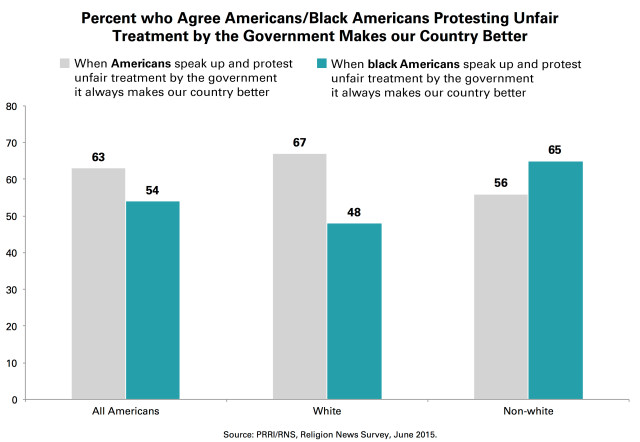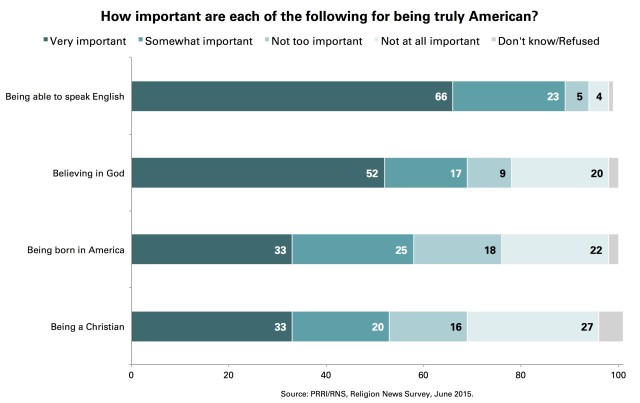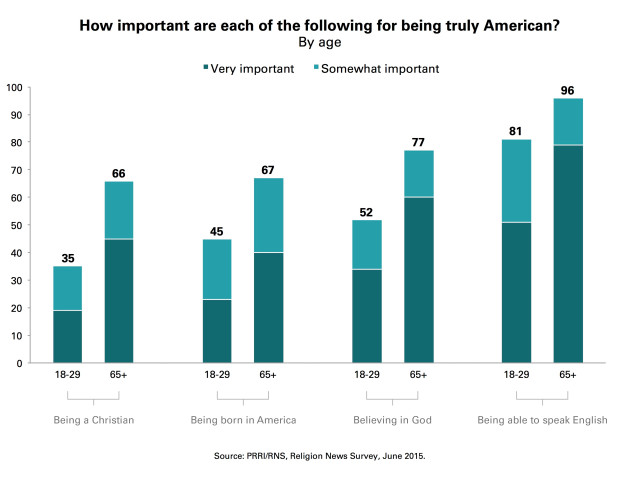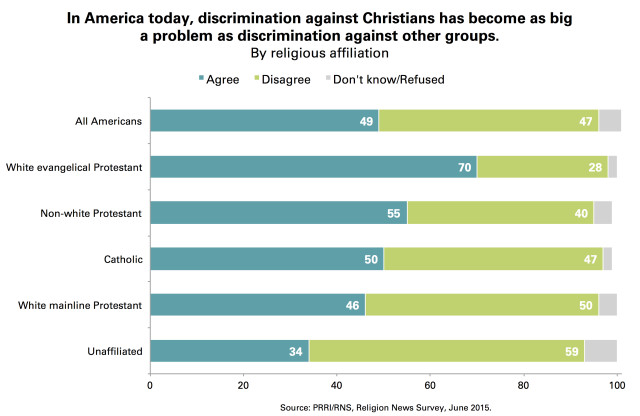I. White Americans Less Likely to Say Protests by Blacks Are Good for U.S.
The public generally agrees that when Americans speak up and protest unfair treatment by the government, it makes the country better. Sixty-three percent of the public say that protesting unfair government treatment is always a good thing for the country, while less than one-third (32%) disagree. However, Americans are somewhat less likely to see the benefits of protests among black Americans. A majority (54%) of the public agree that the country is always better off when black Americans protest and speak out against unfair treatment by the government, while roughly four in ten (39%) disagree.
There is an even larger gap on these two questions among white Americans. Two-thirds (67%) of white Americans agree that Americans protesting government mistreatment always leave the country better off. But fewer than half (48%) of whites say the same when asked about black Americans speaking out against and protesting unfair treatment by the government.
Views of non-white Americans are markedly different from the views of whites on this issue. (Due to sample size limitations it was not possible to break out the views of black Americans independently). Non-white Americans are actually more likely to agree that the country is better off when black Americans protest unfair treatment than when Americansin general protest unfair treatment. A majority (56%) of non-white Americans agree that Americans protesting unfair treatment by the government makes the U.S. better, but nearly two thirds (65%) say that black Americans protesting unfair treatment makes the country better.
II. Most Believe in American Exceptionalism
More than six in ten (62%) Americans believe that God has granted America a special role in human history, while roughly one-third (33%) disagree. Views have not shifted significantly in recent years. In 2012, an identical number of Americans (62%) agreed that the U.S. was granted a special role in human history. There are sharp differences on this question by political ideology and religious affiliation.
Conservatives are nearly twice as likely as liberals to agree that God has granted the U.S. a special role in human history—80% of conservatives and only 45% of liberals agree with this statement. Half (50%) of liberals reject the notion that the country has a divinely sanctioned role in human history.
White evangelical Protestants are unique among religious Americans in their affirmation of American exceptionalism. More than eight in ten (83%) white evangelical Protestants agree that God has granted the country a special role in human history. Seven in ten non-white Protestants (73%) and Catholics (70%) and a majority (56%) of white mainline Protestants also believe in a divinely chosen role for the U.S. In contrast, a majority (53%) of religiously unaffiliated Americans disagree that God granted the U.S. a special role, compared to fewer than four in ten (39%) who agree.
Americans are proud of their national identity. In fact, few Americans report a time when they were not proud to be an American. More than six in ten (63%) Americans say there has never been a time in their life when they have not felt proud about being American. Roughly one-third (35%) say that at some point, they did not feel proud of their nationality.
More than eight in ten (83%) Americans say that it is important to publicly show support for the U.S. by doing things such as displaying the American flag; only 14% of the public disagree. Across political and religious spectrums, Americans embrace the importance of public demonstrations of patriotism.
The U.S. is Not Setting a Good Moral Example for the World
At the same time, most Americans do not believe the U.S. today sets a good moral example for the rest of the world. Forty-three percent of the public say the U.S. is currently setting a good example, while a majority (53%) of Americans disagree. A notable gender gap exists on this issue; men are more likely than women to believe that the U.S. sets a good moral example—51% vs. 36%, respectively. Six in ten (60%) women say America is not setting a good example for the rest of the world.
Also striking is the absence of a significant political divide this issue. Democrats are roughly as likely as Republicans (49% vs. 44%, respectively) to believe that the U.S. serves as a moral example to the rest of the world. A majority of Republicans (54%) and nearly half of Democrats (47%) say the U.S. does not offer a good moral example. Fewer than four in ten (38%) independents agree that U.S. is setting a good example, while close to six in ten (58%) disagree.
III. Who Counts as “Truly” American?
More than any other quality, Americans think that speaking English is an essential part of being American: roughly nine in ten (89%) Americans say that speaking English is important to being “truly” American, including roughly two-thirds (66%) who say it is very important. A strong majority (69%) of Americans also say that believing in God is an important component of being a true American. Americans also value native citizenship when considering what it takes to be an American: roughly six in ten (58%) say that being born in the U.S. is an important part of being American. Americans are more divided on the importance of being Christian: a majority (53%) of the public say that being a Christian is an important part of being truly American, while 43% say this is not too or not at all important.
Younger and older Americans disagree sharply over what is most important to being American. Roughly two-thirds (66%) of seniors (age 65 and older) say that being a Christian is an important part of being American, while only about one-third (35%) of young adults (age 18-29) agree. There is also a substantial generational gap on the importance of being born in the U.S. Two-thirds (67%) of seniors say that being born in the U.S. is important, but fewer than half (45%) of younger Americans say the same. Older Americans are also more likely to say that believing in God is critical to being American. More than three-quarters (77%) of seniors say believing in God is important. Young adults are much more closely divided: 52% say that believing in God is an important part of being American, while nearly as many (45%) say this is not important. But both seniors and young adults agree on one thing: the importance of being able to speak English: 96% and 81%, respectively, say speaking English is an important part of being American.
With one notable exception, Democrats and Republicans largely agree on the attributes and experiences that are important to being American. Equal numbers of Democrats (62%) and Republicans (62%) say that being born in America is important to being truly American. Members of both political parties also believe in the importance of speaking the English language: more than eight in ten (84%) Democrats and more than nine in ten (93%) Republicans say speaking English is important. Republicans are more likely to say believing in God is an important part of being American, although a substantial majority of both parties say that it is (81% vs. 63%, respectively). Democrats and Republicans part ways in their views about the importance of Christian identity. Nearly seven in ten (69%) Republicans say that being a Christian is an important part of being American, while Democrats are more divided. Forty-six percent of Democrats say being a Christian is important, while just about as many (48%) say this is not an important part of being American.
Perhaps not surprisingly, most Christians say that being a Christian is an important part of being American. Three-quarters (75%) of white evangelical Protestants and nearly seven in ten (69%) non-white Protestants say that Christian identity and American identity are intertwined. A majority of white mainline Protestants (54%) and Catholics (55%) also say that being a Christian is important for being truly American. In contrast, fewer than three in ten (29%) religiously unaffiliated Americans believe in the importance of Christian identity; two-thirds (67%) say it is not important.
One-quarter of Public Doesn’t Consider Themselves a “Typical” American
Sixty-nine percent of the public report that they think of themselves as a “typical” American, while roughly one in four (26%) Americans say they are very different from the typical American.
There are notable divisions in self-perceptions by race and ethnicity. White Americans are most likely to see themselves as typical, with nearly eight in ten (77%) reporting they think they are typical, compared to roughly six in ten (61%) black Americans. Hispanic Americans are evenly divided between those who say they are typical (48%) and those who say they are very different from a typical American (48%).
There are also sizable differences between young and older Americans. Nearly eight in ten (78%) seniors say they see themselves as typical, compared to 55% of young Americans who say the same.
IV. A Christian Nation No Longer?
Most Americans do not believe America is a Christian nation today, even if many say it was in the past. About one-third (35%) of the public believe the U.S. was a Christian nation in the past and is still a Christian nation today; close to half (45%) say the U.S. was once a Christian nation but no longer remains so today; and 14% say the U.S. has never been a Christian nation. The number of Americans who believe the U.S. is a Christian nation has declined steadily over the past five years. In 2010, more than four in ten (42%) Americans said the U.S. has always been and is currently a Christian nation.
Like Americans overall, most Christians do not believe that America is still a Christian nation today. Only about four in ten white evangelical Protestants (42%), non-white Protestants (39%), and Catholics (39%) believe the U.S. is a Christian nation today. Fewer white mainline Protestants (33%) and religiously unaffiliated Americans (27%) say America is a Christian nation. A majority (56%) of white evangelical Protestants and nearly half (48%) of white mainline Protestants say the U.S. was a Christian nation at one time but is no longer. About four in ten non-white Protestants (42%), Catholics (41%), and religiously unaffiliated Americans (40%) say America was a Christian nation in the past, but is not today.
Most Americans who believe the U.S. is no longer a Christian nation view this change negatively. Among Americans who believe the U.S. was once a Christian nation but is not anymore, roughly six in ten (61%) say that this is a bad thing, while about three in ten (29%) say that it is a good thing.
Americans Divided on Discrimination Against Christians
Americans are divided over whether Christians—who make up 72% of the adult population—are now facing as much discrimination as other groups. Nearly half (49%) of the public say that discrimination against Christians has become as big of a problem as discrimination against other groups, while approximately as many (47%) disagree.
There are notable differences among Americans by religious affiliation. Seven in ten (70%) white evangelical Protestants agree that discrimination against Christians has become as bad as discrimination against other groups. A majority (55%) of non-white Protestants also agree that discrimination against Christians has become as problematic as other types of discrimination, while white mainline Protestants (46% agree vs. 50% disagree) and Catholics (50% agree vs. 47% disagree) are divided. Nearly six in ten (59%) religiously unaffiliated Americans do not think that discrimination against Christians is comparable to that against other groups.
V. Support for Immigration Reform Remains Solid
Americans continue to express support for reforming the immigration system to allow immigrants living in the U.S. illegally a way to become citizens. More than six in ten (64%) Americans say that the immigration system should allow immigrants a way to become citizens provided they meet certain requirements. Fifteen percent say they should be allowed to become permanent legal residents and not citizens, while 16% say they should be deported. American views on immigration reform have not budged in recent years.
Similar numbers of Americans (66%) favor allowing illegal immigrants brought to the U.S. as children to gain legal resident status if they join the military or attend college, while fewer than three in ten (29%) Americans oppose this policy. Americans express even greater support for granting a reprieve to illegal immigrants who are the parents of children with legal status. Nearly three-quarters (73%) of the public favor allowing illegal immigrants whose children have legal status to stay in the country for up to three years without being subject to deportation if they pass a background check and have lived in the U.S. for at least five years.
Few Believe Immigration Issue Will Hurt GOP in 2016
Four in ten (41%) Americans say they trust the Democratic Party more to handle the issue of immigration, while one-quarter (25%) say they trust the GOP to do a better job on the issue. Notably, roughly one-quarter (24%) of Americans say that they do not trust either party when it comes to handling the issue of immigration.
Trust on the issue of immigration varies markedly by race and ethnicity. Nearly seven in ten (68%) black Americans and half (50%) of Hispanic Americans say they trust the Democratic Party more on immigration, while few say they have greater confidence in the GOP (14% and 16%, respectively). One-third (33%) of Hispanic Americans say they do not trust either party or offer no opinion on the question. White Americans are nearly evenly divided: 33% trust Democrats more; 32% trust Republicans more; and 28% trust neither.
Most Americans do not believe the Republican Party’s position on immigration will adversely affect its electoral prospects in the 2016 election. About four in ten (38%) Americans say its position will not make a difference in the upcoming election, while about one-third (34%) say it will hurt the party’s chances. Fewer than one in five (15%) say the GOP’s position on immigration will help the party in 2016. More than one in ten (13%) Americans did not express an opinion on the issue.
Democrats are most likely to say that Republican Party’s stance on immigration will hurt them in the upcoming election. Half (50%) of all Democrats say that the GOP’s approach on immigration will hurt the party, while fewer than one-third of independents (31%) and Republicans (23%) agree. Republicans are more likely to say the issue will help the party than say it will hurt it (28% vs. 23%, respectively).
Majority Believes Immigrants Strengthen American Society
Americans overall are much more likely to say immigrants strengthen society (54%) than to say they threaten traditional American customs and values (33%). Views on this issue have not shifted significantly in recent years.
There are notable partisan divides on immigrants’ cultural impact. A majority of both Democrats (64%) and independents (54%) say that the growing number of immigrants coming to the U.S. today strengthens American society. Fewer than four in ten (39%) Republicans agree, while nearly half (47%) say that immigrants from other countries threaten traditional American customs and values.
Recommended citation:
Jones, Robert P., and Daniel Cox. “Most Americans Believe Protests Make the Country Better; Support Decreases Dramatically among Whites if Protesters Are Identified as Black.” PRRI. 2015. http://www.prri.org/research/survey-americans-believe-protests-make-country-better-support-decreases-dramatically-protesters-identified-black/.






